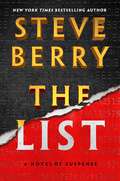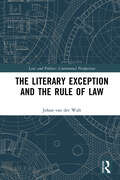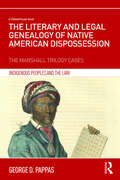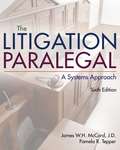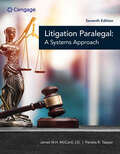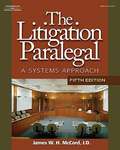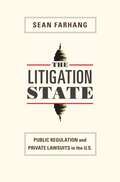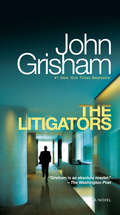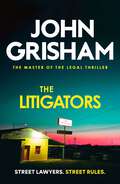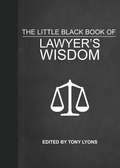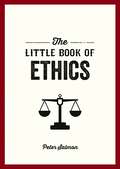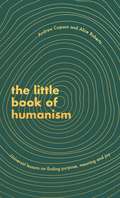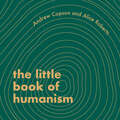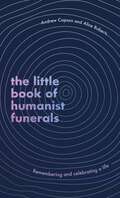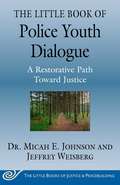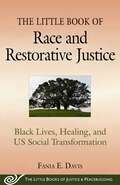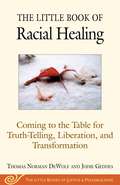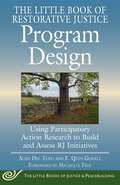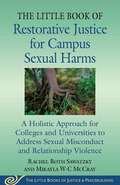- Table View
- List View
The List
by Steve BerryIn the vein of David Baldacci, John Grisham, and Harlan Coben—this is Steve Berry like you&’ve never read him before. After a ten-year self-imposed exile, Brent Walker is returning home to Concord, a quaint town in central Georgia nestled close to the Savannah River. Two years ago, his father died, and now Brent, hired by Southern Republic Pulp and Paper Company as its assistant general counsel, is returning to care for his ailing mother. For decades, Southern Republic has invested heavily in Concord, creating a thriving community where its employees live, work, and retire. But the genteel sheen of this quiet town is deceiving, and when a list of cryptic code surfaces, Brent starts to see the cracks. Southern Republic&’s success is based largely on a highly unorthodox and deadly system to control costs, known only to the three owners of the company. Now, one of them, Christopher Bozin, has had a change of heart. Brent&’s return to Concord, a move Bozin personally orchestrated, provides his conscience with a chance at redemption. So a plan is set into motion, one that will not only criminally implicate Bozin&’s two partners, but also place Brent Walker square in the crosshairs of men who want him dead—with only one course left available. Find and reveal the shocking secret of the list.
The Literary Exception and the Rule of Law (Law and Politics)
by Johan Van Der WaltAddressing the influential analysis of law and literature, this book offers a new perspective on their relationship. The law and literature movement that has gained global prominence in the course of last decades of the twentieth and the first decades of the twenty-first centuries has provided the research and teaching of law with a considerable body of new and valuable knowledge and understanding. Most of the knowledge and insights generated by the movement concern either a thematic overlap between legal and literary discourses – suggesting they deal with the same moral concerns – or a rhetorical, semiotic or general linguistic comparability or ‘sameness’ between them – imputing to both the same or very similar narrative structures. The Literary Exception and the Rule of Law recognises the wealth of knowledge generated by this approach to the relationship between law and literature, and acknowledges its debt to this genre of scholarship. It nevertheless also proposes, on the basis of a number of revealing phenomenological inquiries, a different approach to law and literary studies: one that emphasises the irreducible difference between law and literature. It does so with the firm believe that a regard for the very different and indeed opposite discursive trajectories of legal and literary language allows for a more profound understanding of the unique and indeed separate roles that the discourses of law and literature generally play in the sustenance of relatively stable legal cultures. This important rethinking of the relationship between law and literature will appeal to scholars and students of legal theory, jurisprudence, philosophy, politics and literary theory.
The Literary and Legal Genealogy of Native American Dispossession: The Marshall Trilogy Cases (Indigenous Peoples and the Law)
by George D PappasThe Literary and Legal Genealogy of Native American Dispossession offers a unique interpretation of how literary and public discourses influenced three U.S. Supreme Court Rulings written by Chief Justice John Marshall with respect to Native Americans. These cases, Johnson v. M’Intosh (1823), Cherokee Nation v. Georgia (1831) and Worcester v. Georgia (1832), collectively known as the Marshall Trilogy, have formed the legal basis for the dispossession of indigenous populations throughout the Commonwealth. The Trilogy cases are usually approached as ‘pure’ legal judgments. This book maintains, however, that it was the literary and public discourses from the early sixteenth through to the early nineteenth centuries that established a discursive tradition which, in part, transformed the American Indians from owners to ‘mere occupants’ of their land. Exploring the literary genesis of Marshall’s judgments, George Pappas draws on the work of Michel Foucault, Edward Said and Homi Bhabha, to analyse how these formative U.S. Supreme Court rulings blurred the distinction between literature and law.
The Litigation Paralegal: A Systems Approach
by James W. H. McCord Pamela TepperCombining theories and principles of law with practical skills, this engaging, highly visual text includes numerous forms, checklists, and online resources in the context of the law office. The book covers the latest electronic discovery issues and the associated ethical and practical responsibilities of the paralegal. It also includes a wide range of new and updated cases, practical tips, assignments, key terms, and study questions to help you master the content.
The Litigation Paralegal: A Systems Approach
by Pamela R. Tepper James W.H. McCordCombining theories and principles of law with practical skills, McCord/Tepper's THE LITIGATION PARALEGAL: A SYSTEMS APPROACH, 7th edition, gives students an engaging, highly visual overview of the role of the paralegal in today's legal settings. Detailed exhibits, forms, checklists and practical tips illustrate the realities of paralegal work, while the book's proven step-by-step law office litigation system stresses organizational skills and quality control techniques. The new edition covers the latest electronic discovery issues and the associated ethical and practical responsibilities of the lawyer and paralegal as well as work-life balance in the legal profession and the impact of social media in the litigation setting. A wide range of new and updated cases, assignments, key terms and study questions help students master the content, and new assignments emphasize the importance of ethics.
The Litigation Paralegal: A Systems Approach Fifth Edition
by James W. H. MccordEducators and students alike will benefit from the clear presentation of material, the emphasis on ethics, the extensive coverage of electronic discovery and filing, as well as features such as the medical guide, numerous checklists, provocative quotations, and a wealth of practical assignments set in the context of one or more litigation cases
The Litigation State: Public Regulation and Private Lawsuits in the U.S. (Princeton Studies in American Politics: Historical, International, and Comparative Perspectives #115)
by Sean FarhangOf the 1.65 million lawsuits enforcing federal laws over the past decade, 3 percent were prosecuted by the federal government, while 97 percent were litigated by private parties. When and why did private plaintiff-driven litigation become a dominant model for enforcing federal regulation? The Litigation State shows how government legislation created the nation's reliance upon private litigation, and investigates why Congress would choose to mobilize, through statutory design, private lawsuits to implement federal statutes. Sean Farhang argues that Congress deliberately cultivates such private lawsuits partly as a means of enforcing its will over the resistance of opposing presidents. Farhang reveals that private lawsuits, functioning as an enforcement resource, are a profoundly important component of American state capacity. He demonstrates how the distinctive institutional structure of the American state--particularly conflict between Congress and the president over control of the bureaucracy--encourages Congress to incentivize private lawsuits. Congress thereby achieves regulatory aims through a decentralized army of private lawyers, rather than by well-staffed bureaucracies under the president's influence. The historical development of ideological polarization between Congress and the president since the late 1960s has been a powerful cause of the explosion of private lawsuits enforcing federal law over the same period. Using data from many policy areas spanning the twentieth century, and historical analysis focused on civil rights, The Litigation State investigates how American political institutions shape the strategic design of legislation to mobilize private lawsuits for policy implementation.
The Litigators
by Lindsay G. Arthur Jr.A waste site near Ruthie Bergstrom's house was recently treated with a new process using genetically engineered microbes, and suddenly Ruthie develops a mysterious neurological illness. By chance, she meets a passionate young lawyer at a neighborhood church supper. He feels obligated to find justice for his new struggling client and in the process takes on the largest law firm in Minnesota. How far will Dillon Love go for his client if the end result of his lawsuit is to destroy the brilliant university professor who has dedicated his entire life to improving the environment? How far will Henry Holten go to defeat the graceful woman whose family and financial future is dependent upon the success of her court case?The Litigators is a riveting page-turner, which asks if there can be any justice for either party without infliction of a great injustice on the other. This winner-takes-all legal battle brings together three tenacious lawyers and their highly worthy clients in a way that forever changes all of their lives.
The Litigators (india Only Local Print)
by John GrishamAfter leaving a fast-track legal career and going on a serious bender, David Zinc is sober, unemployed, and desperate enough to take a job at Finley & Figg, a self-described “boutique law firm” that is anything but. <P><P>Oscar Finley and Wally Figg are in fact just two ambulance chasers who bicker like an old married couple. But now the firm is ready to tackle a case that could make the partners rich—without requiring them to actually practice much law. A class action suit has been brought against Varrick Labs, a pharmaceutical giant with annual sales of $25 billion, alleging that Krayoxx, its most popular drug, causes heart attacks. Wally smells money. All Finley & Figg has to do is find a handful of Krayoxx users to join the suit. It almost seems too good to be true . . . and it is.
The Litigators: A Novel
by John Grisham#1 NEW YORK TIMES BESTSELLER • After leaving a fast-track legal career and going on a serious bender, David Zinc is sober, unemployed, and desperate enough to take a job at Finley & Figg, a self-described &“boutique law firm&” that is anything but. Oscar Finley and Wally Figg are in fact just two ambulance chasers who bicker like an old married couple. But now the firm is ready to tackle a case that could make the partners rich—without requiring them to actually practice much law. A class action suit has been brought against Varrick Labs, a pharmaceutical giant with annual sales of $25 billion, alleging that Krayoxx, its most popular drug, causes heart attacks. Wally smells money. All Finley & Figg has to do is find a handful of Krayoxx users to join the suit. It almost seems too good to be true ... and it is.Don&’t miss John Grisham&’s new book, THE EXCHANGE: AFTER THE FIRM!
The Litigators: The blockbuster bestselling legal thriller from John Grisham
by John GrishamThe classic legal thriller and huge bestseller from master of the genre John Grisham.David Zinc has it all: Big firm, big salary, life in the lawyer's fast lane.Until the day he snaps and throws it all away.Leaving the world of corporate law far behind, he talks himself into a new job with Finley & Figg. A self-styled 'boutique' firm with only two partners, Oscar Finley and Wally Figg are ambulance-chasing street lawyers who hustle nickel-and-dime cases, dreaming of landing the big win.For all his Harvard Law Degree and five years with Chicago's top firm, Zinc has never entered a courtroom, never helped a client who really needed a lawyer, never handled a gun.All that is about to change.(P)2011 Random House Audio
The Litigators: The compelling crime thriller from the number 1 Sunday Times bestselling author
by John GrishamSTREET LAWYERS. STREET RULES.David Zinc lives life in the fast lane - until he unexpectedly veers off course.Leaving behind his high-end job as a corporate lawyer, Zinc finds himself at Finley & Figg, an upstart firm of Chicago street lawyers and ambulance chasers going head-to-head with Big Pharma.Zinc has never entered a courtroom. He's never helped a client in desperate need. He's never handled a gun.All that is about to change.💥350+ million copies, 45 languages, 10 blockbuster films: JOHN GRISHAM IS THE MASTER OF THE LEGAL THRILLER💥The Litigators is a hit with readers:'John Grisham is a first rate story teller' ⭐ ⭐ ⭐ ⭐ ⭐ 'Compelling' ⭐ ⭐ ⭐ ⭐ ⭐ 'Another barnstormer of legal fiction from the master of his craft'⭐ ⭐ ⭐ ⭐ ⭐ 'Great fun'⭐ ⭐ ⭐ ⭐ ⭐
The Little Black Book of Lawyer's Wisdom
by Tony LyonsA handy guide to legal wisdom past and present.To be a lawyer or a politician or a judge, one must dedicate their lives to serving the public good. For anyone considering a career in law or anyone interested in philosophy, politics, and/or government, herein you will find an entertaining and educational collection of legal wisdom from some of history’s greatest thinkers. The road to justice is not always easy. It is fraught with conflict, scandal, adversity, and sleepless nights. It is a noble and necessary pursuit as society continues to progress and seek equality for all. Words from renowned lawyers, judges, authors, politicians, philosophers, and preachers make up this diverse assortment of over two hundred memorable, bite-sized quotations about justice, philosophy, crime, the life of a lawyer, landmark cases, and more!Included are such quotations as:"Let all laws by clear, uniform, and precise; to interpret laws is almost always to corrupt them.” -Voltaire"If in your own judgment you cannot be an honest lawyer, resolve to be honest without being a lawyer.” -President Abraham Lincoln"The first duty of society is justice.” -Alexander Hamilton"A system of justice is the richer for diversity of background and experience.” -U.S. Supreme Court Justice Ruth Bader Ginsburg
The Little Book of Ethics: An Introduction to the Key Principles and Theories You Need to Know
by Peter SalmonThis accessible and thought-provoking guide will take you on a captivating exploration of the fundamental questions that form our decisions and actions, asking, what is the right thing to do in a certain set of circumstances? What can we base our decision on? Is there always a correct decision, or is it always a bit unclear?
The Little Book of Humanism: Universal lessons on finding purpose, meaning and joy
by Andrew Copson Alice RobertsTHE SUNDAY TIMES BESTSELLERWe all want to lead a happy life. Traditionally, when in need of guidance, comfort or inspiration, many people turn to religion. But there has been another way to learn how to live well - the humanist way - and in today's more secular world, it is more relevant than ever.In THE LITTLE BOOK OF HUMANISM, Alice Roberts and Andrew Copson share over two thousand years of humanist wisdom through an uplifting collection of stories, quotes and meditations on how to live an ethical and fulfilling life, grounded in reason and humanity.With universal insights and beautiful original illustrations, THE LITTLE BOOK OF HUMANISM is a perfect introduction to and a timeless anthology of humanist thought from some of history and today's greatest thinkers.
The Little Book of Humanism: Universal lessons on finding purpose, meaning and joy
by Andrew Copson Alice RobertsTHE SUNDAY TIMES BESTSELLERWe all want to lead a happy life. Traditionally, when in need of guidance, comfort or inspiration, many people turn to religion. But there has been another way to learn how to live well - the humanist way - and in today's more secular world, it is more relevant than ever.In THE LITTLE BOOK OF HUMANISM, Alice Roberts and Andrew Copson share over two thousand years of humanist wisdom through an uplifting collection of stories, quotes and meditations on how to live an ethical and fulfilling life, grounded in reason and humanity.With universal insights and beautiful original illustrations, THE LITTLE BOOK OF HUMANISM is a perfect introduction to and a timeless anthology of humanist thought from some of history and today's greatest thinkers.
The Little Book of Humanism: Universal lessons on finding purpose, meaning and joy
by Andrew Copson Alice RobertsTHE SUNDAY TIMES BESTSELLERWe all want to lead a happy life. Traditionally, when in need of guidance, comfort or inspiration, many people turn to religion. But there has been another way to learn how to live well - the humanist way - and in today's more secular world, it is more relevant than ever.In THE LITTLE BOOK OF HUMANISM, Alice Roberts and Andrew Copson share over two thousand years of humanist wisdom through an uplifting collection of stories, quotes and meditations on how to live an ethical and fulfilling life, grounded in reason and humanity.With universal insights and beautiful original illustrations, THE LITTLE BOOK OF HUMANISM is a perfect introduction to and a timeless anthology of humanist thought from some of history and today's greatest thinkers.
The Little Book of Humanist Funerals: Remembering and celebrating a life
by Andrew Copson Alice RobertsFrom the Sunday Times bestselling authors of THE LITTLE BOOK OF HUMANISMA humanist funeral allows us the freedom to remember and celebrate the life of someone in exactly the way we want to and - as the most popular alternative to a religious ceremony - put us more closely in touch with the precious nature of life.In a beautiful collection of insights from humanist celebrants, as well as quotes, poems and meditations from humanist writers and thinkers throughout history, THE LITTLE BOOK OF HUMANIST FUNERALS is the perfect introduction to the humanist approach to life and death.
The Little Book of Humanist Funerals: Remembering and celebrating a life
by Andrew Copson Alice RobertsFrom the Sunday Times bestselling authors of THE LITTLE BOOK OF HUMANISMA humanist funeral allows us the freedom to remember and celebrate the life of someone in exactly the way we want to and - as the most popular alternative to a religious ceremony - put us more closely in touch with the precious nature of life.In a beautiful collection of insights from humanist celebrants, as well as quotes, poems and meditations from humanist writers and thinkers throughout history, THE LITTLE BOOK OF HUMANIST FUNERALS is the perfect introduction to the humanist approach to life and death.
The Little Book of Plagiarism
by Richard A. PosnerA concise, lively, and bracing exploration of an issue bedeviling our cultural landscape–plagiarism in literature, academia, music, art, and film–by one of our most influential and controversial legal scholars. Best-selling novelists J. K. Rowling and Dan Brown, popular historians Doris Kearns Goodwin and Stephen Ambrose, Harvard law professor Charles Ogletree, first novelist Kaavya Viswanathan: all have rightly or wrongly been accused of plagiarism–theft of intellectual property–provoking widespread media punditry. But what exactly is plagiarism? How has the meaning of this notoriously ambiguous term changed over time as a consequence of historical and cultural transformations? Is the practice on the rise, or just more easily detectable by technological advances? How does the current market for expressive goods inform our own understanding of plagiarism? Is there really such a thing as “cryptomnesia,” the unconscious, unintentional appropriation of another’s work? What are the mysterious motives and curious excuses of plagiarists? What forms of punishment and absolution does this “sin” elicit? What is the good in certain types of plagiarism? Provocative, insightful, and extraordinary for its clarity and forthrightness,The Little Book of Plagiarismis an analytical tour de force in small, the work of “one of the top twenty legal thinkers in America” (Legal Affairs), a distinguished jurist renowned for his adventuresome intellect and daring iconoclasm.
The Little Book of Police Youth Dialogue: A Restorative Path Toward Justice (Justice and Peacebuilding)
by Dr. Micah E. Johnson Jeffrey WeisbergDiscover the police-youth dialogue (PYD) as a method to build trustworthiness, mend relationships, and heal historical harms between black youth and law enforcement. This timely book from the Justice and Peacebuilding series offers an explanation of the need for meaningful dialogue between law enforcement and black youth, a blueprint for implementing police-youth dialogues, best practices and examples, anecdotes and narratives from participants, different models and formats, potholes and limitations, and tangible tools and action steps for starting a police-youth dialogue program. Ultimately, the strategies and techniques used in effective police-youth dialogues can bring attention to issues of implicit bias and the impact of toxic stress on marginalized groups, ameliorate tensions between law enforcement officers and black youth, and build toward a model of community policing and restorative justice rather than punitive discipline and violence.The Little Book of Police-Youth Dialogue presents readers with relevant knowledge and research regarding trauma and race in the United States, strategies for creating a safe space of attentive listening and mediating genuine connections between police officers and black youth, and specific ways to take action in ameliorating police-youth tensions and promoting healing in their local communities.
The Little Book of Race and Restorative Justice: Black Lives, Healing, and US Social Transformation (The Little Books of Justice and Peacebui)
by Fania E. DavisRacial Justice and Restorative Justice Working Together to Transform the Black Experience in America This timely work will inform scholars and practitioners on the subjects of pervasive racial inequity and the healing offered by restorative justice practices. Addressing the intersectionality of race and the US criminal justice system, social activist Fania E. Davis explores how restorative justice has the capacity to disrupt patterns of mass incarceration through effective, equitable, and transformative approaches. Eager to break the still-pervasive, centuries-long cycles of racial prejudice and trauma in America, Davis unites the racial justice and restorative justice movements, aspiring to increase awareness of deep-seated problems as well as positive action toward change. In The Little Book of Race and Restorative Justice, Davis highlights real restorative justice initiatives that function from a racial justice perspective; these programs are utilized in schools, justice systems, and communities, intentionally seeking to ameliorate racial disparities and systemic inequities. Furthermore, she looks at initiatives that strive to address the historical harms against African Americans throughout the nation. This newest addition the Justice and Peacebuilding series is a much needed and long overdue examination of the issue of race in America as well as a beacon of hope as we learn to work together to repair damage, change perspectives, and strive to do better.
The Little Book of Racial Healing: Coming to the Table for Truth-Telling, Liberation, and Transformation (The Little Books of Justice and Peacebui #1)
by Thomas Norman Dewolfe Geddes JodiePeople of color, relative to white people, fall on the negative side of virtually all measurable social indicators. The “living wound” is seen in the significant disparities in average household wealth, unemployment and poverty rates, infant mortality rates, access to healthcare and life expectancy, education, housing, and treatment within, and by, the criminal justice system. Coming to the Table (CTTT) was born in 2006 when two dozen descendants from both sides of the system of enslavement gathered together at Eastern Mennonite University (EMU), in collaboration with the Center for Justice & Peacebuilding (CJP). Stories were shared and friendships began. The participants began to envision a more connected and truthful world that would address the unresolved and persistent effects of the historic institution of slavery. This Little Book shares Coming to the Table’s vision for the United States—a vision of a just and truthful society that acknowledges and seeks to heal from the racial wounds of the past. Readers will learn practical skills for better listening; discover tips for building authentic, accountable relationships; and will find specific and varied ideas for taking action.
The Little Book of Restorative Justice Program Design: Using Participatory Action Research to Build and Assess RJ Initiatives (Justice and Peacebuilding)
by Alisa Del Tufo E. Quin GonellA concise and practical guide to bringing the day-to-day practice of restorative justice programs into closer alignment with restorative values.In the past twenty-five years there has been an explosion of programs, projects, and initiatives that use the terms &“restorative justice&” or &“restorative practices.&” This reflects multiple trends: the failures and inhumanity of justice system policies and practices; the unfairness and ineffectiveness of &“zero tolerance&” and other punitive measures adopted in our schools, and the positive impact of those who have promoted restorative practices for the past several decades around the world. This complex mix has generated an array of programs that utilize restorative ideas and practices in a wide variety of ways, such as court diversion, deeply spiritual circle work, and national and international truth and reconciliation projects. Some of these programs are designed to address incidences of harm that fall within large systems (family group conferencing, victim offender dialogue, circles, COSA, etc.) or in schools where they are often focused on addressing incidences of harm in an effort to change the over reliance on suspensions and expulsions as a way to modify student behaviors. There are other experiments in restorative justice that move this work into community settings, with a focus on healing and the creation of more empathic relationships. As the authors know from experience, there is often a gap between values and the reality of day to day practice. This Little Book strives to find ways to shrink that gap and to bring our practice and the structures and methods that employ them into closer alignment with restorative values. Simply put, this book asks, how can we better align restorative theory and practice in our work? In order to have truly restorative programs (programs that strive for consistency between their stated values and their real-life practices) the authors offer some ways to integrate restorative practices and values into the strategies used to design, implement, and assess them. They propose the use of another transformative practice, Participatory Action Research (PAR), as a powerful ally in the work of developing restorative practices and the programs that hold them.
The Little Book of Restorative Justice for Campus Sexual Harms: A Holistic Approach for Colleges and Universities to Address Sexual Misconduct and Relationship Violence (Justice and Peacebuilding)
by Rachel Roth Sawatzky Mikayla W-C McCrayA restorative justice approach to addressing sexual misconduct in colleges and universities. Written for college and university practitioners and administrators, The Little Book of Restorative Justice for Campus Sexual Harms: A Holistic Approach to Address Sexual Misconduct and Relationship Violence for Colleges and Universities combines explanation, justification, and contextualization for the application of restorative justice (RJ) for sexual misconduct, including for alleged Title IX violations. This book outlines considerations, action steps, and best practices for campuses that are interested in exploring the successful implementation of RJ for sexual misconduct. The authors' backgrounds as practitioners within the higher education context grounds this work with personal reflections, experiences, and stories. This book provides a primer for colleges and universities who seek to move campus culture in a more restorative direction generally, and specifically for practitioners interested in exploring the possibility of amending existing sexual misconduct policies, including investigative-adjudicatory Title IX policy and procedures, through a restorative justice informed lens. Readers will explore why it makes all the difference (for both students and administrators) to add RJ resolution options.
